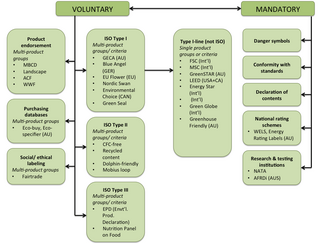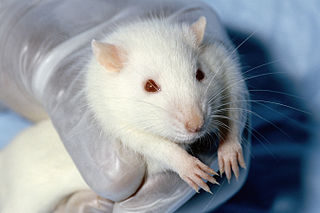Standardization or standardisation is the process of implementing and developing technical standards based on the consensus of different parties that include firms, users, interest groups, standards organizations and governments. Standardization can help maximize compatibility, interoperability, safety, repeatability, or quality. It can also facilitate a normalization of formerly custom processes.
Marketing research is the systematic gathering, recording, and analysis of qualitative and quantitative data about issues relating to marketing products and services. The goal is to identify and assess how changing elements of the marketing mix impacts customer behavior.

Ecolabels and Green Stickers are labeling systems for food and consumer products. The use of ecolabels is voluntary, whereas green stickers are mandated by law; for example, in North America major appliances and automobiles use Energy Star. They are a form of sustainability measurement directed at consumers, intended to make it easy to take environmental concerns into account when shopping. Some labels quantify pollution or energy consumption by way of index scores or units of measurement, while others assert compliance with a set of practices or minimum requirements for sustainability or reduction of harm to the environment. Many ecolabels are focused on minimising the negative ecological impacts of primary production or resource extraction in a given sector or commodity through a set of good practices that are captured in a sustainability standard. Through a verification process, usually referred to as "certification", a farm, forest, fishery, or mine can show that it complies with a standard and earn the right to sell its products as certified through the supply chain, often resulting in a consumer-facing ecolabel.
Kansei engineering aims at the development or improvement of products and services by translating the customer's psychological feelings and needs into the domain of product design. It was founded by Mitsuo Nagamachi, Professor Emeritus of Hiroshima University. Kansei engineering parametrically links the customer's emotional responses to the properties and characteristics of a product or service. In consequence, products can be designed to bring forward the intended feeling.

Food technology is a branch of food science that addresses the production, preservation, quality control and research and development of food products.
Sensory analysis is a scientific discipline that applies principles of experimental design and statistical analysis to the use of human senses for the purposes of evaluating consumer products. The discipline requires panels of human assessors, on whom the products are tested, and recording the responses made by them. By applying statistical techniques to the results it is possible to make inferences and insights about the products under test. Most large consumer goods companies have departments dedicated to sensory analysis. Sensory analysis can mainly be broken down into three sub-sections:
Quantitative psychology is a field of scientific study that focuses on the mathematical modeling, research design and methodology, and statistical analysis of psychological processes. It includes tests and other devices for measuring cognitive abilities. Quantitative psychologists develop and analyze a wide variety of research methods, including those of psychometrics, a field concerned with the theory and technique of psychological measurement.

Alternatives to animal testing are the development and implementation of test methods that avoid the use of live animals.

The European Directorate for the Quality of Medicines & HealthCare (EDQM) is a Directorate of the Council of Europe that traces its origins and statutes to the Convention on the Elaboration of a European Pharmacopoeia.
VA is a non-profit association that wants to promote dialogue and openness between researchers and the general public. VA operates primarily in Sweden, but with an eye on European and International science communication including several new EU projects. The organization was founded in 2002 and is currently based from Grev Turegatan 14 in Stockholm, Sweden.

Organic food, ecological food, or biological food are foods and drinks produced by methods complying with the standards of organic farming. Standards vary worldwide, but organic farming features practices that cycle resources, promote ecological balance, and conserve biodiversity. Organizations regulating organic products may restrict the use of certain pesticides and fertilizers in the farming methods used to produce such products. Organic foods are typically not processed using irradiation, industrial solvents, or synthetic food additives.
The Unscrambler X is a commercial software product for multivariate data analysis, used for calibration of multivariate data which is often in the application of analytical data such as near infrared spectroscopy and Raman spectroscopy, and development of predictive models for use in real-time spectroscopic analysis of materials. The software was originally developed in 1986 by Harald Martens and later by CAMO Software.

Insects as food or edible insects are insect species used for human consumption. Over 2 billion people are estimated to eat insects on a daily basis. Globally, more than 2,000 insect species are considered edible, though far fewer are discussed for industrialized mass production and regionally authorized for use in food. Many insects are highly nutritious, though nutritional content depends on species and other factors such as diet and age. Insects offer a wide variety of flavors and are commonly consumed whole or pulverized for use in dishes and processed food products such as burger patties, pasta, or snacks. Like other foods, there can be risks associated with consuming insects, such as allergic reactions. As commercial interest in insects as food grows, countries are introducing new regulatory frameworks to oversee their production, processing, marketing, and consumption.
Sensory design aims to establish an overall diagnosis of the sensory perceptions of a product, and define appropriate means to design or redesign it on that basis. It involves an observation of the diverse and varying situations in which a given product or object is used in order to measure the users' overall opinion of the product, its positive and negative aspects in terms of tactility, appearance, sound and so on.
Soil governance refers to the policies, strategies, and the processes of decision-making employed by nation states and local governments regarding the use of soil. Globally, governance of the soil has been limited to an agricultural perspective due to increased food insecurity from the most populated regions on earth. The Global Soil Partnership, GSP, was initiated by the Food and Agriculture Organization (FAO) and its members with the hope to improve governance of the limited soil resources of the planet in order to guarantee healthy and productive soils for a food-secure world, as well as support other essential ecosystem services.
Sensometrics is a scientific discipline that involves the application of mathematical, statistical, and computational methods to the field of Sensory and Consumer Science. It is an interdisciplinary field, closely related to disciplines such as sensory evaluation, statistics, psychometrics, and chemometrics, among others. Sensometrics deals with all aspects of data generation and analysis, from design of experiments and methods used to investigate perceptions and preferences, to specific tools to analyze and model the data resulting from these methods. Sensometrics plays a key role in Sensory and Consumer Science, providing important tools with applications in product development, quality assurance, market research, and consumer behavior.
Developed by Tragon Corporation in 1974, Quantitative Descriptive Analysis (QDA) is a behavioral sensory evaluation approach that uses descriptive panels to measure a product’s sensory characteristics. Panel members use their senses to identify perceived similarities and differences in products, and articulate those perceptions in their own words. Sensory evaluation is a science that measures, analyzes, and interprets the reactions of the senses of sight, smell, sound, taste, and texture (or kinesthesis) to products. It is a people science; i.e., people are essential to obtain information about products.

The German Federal Institute for Risk Assessment, abbreviated BfR, is a body under public law of the German federal government with full legal capacity. The institute comes under the portfolio of the Federal Ministry of Food and Agriculture and has the task of providing scientific advice to the federal government on issues relating to food safety, product safety, chemical safety, contaminants in the food chain, animal protection and consumer health protection. Further technical supervision is performed by the Federal Ministry for the Environment, Nature Conservation, Building and Nuclear Safety and the Federal Ministry of Transport.

The Complex Engineering Systems Institute (ISCI), is a research group bringing together top researchers from eight different Chilean universities. Housed at Universidad de Chile with Pontificia Universidad Católica de Chile as an associate institution, each of its researchers have been invited to join ISCI based on their academic merit and their existing/potential synergy with other ISCI members. This is the case for all of the 58 current ISCI members, who come from the universities: Universidad de Chile, Pontificia Universidad Católica de Chile, Universidad de Santiago de Chile, Universidad Diego Portales, Universidad Adolfo Ibáñez, Universidad de los Andes, Universidad de Talca, and Universidad de Concepción.

Tormod Næs is a Norwegian statistician working in chemometrics and sensometrics. He studies multivariate statistical analysis, spectroscopy, food science, and sensory science. His impact on chemometrics is exemplified by the over 8,000 citations to his most well-known book, Multivariate Calibration, and the awards in chemometrics that he has received.








